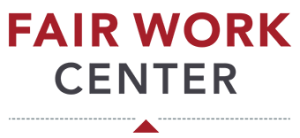Fair Work Center – Seattle, WA

Fair Work Center (FWC) is an organization with a grassroots worker base that is focused on raising and upholding labor standards and building worker power while fighting for economic and racial justice. Fair Work Center supports workers in learning about their rights; developing tools for exercising those rights; organizing and advocating for changes in the workplace, including industry practices, laws, and work values; and holding employers accountable. FWC is committed to empowering workers in all of its policy campaigns.
FWC initially applied to the Fund for WorkforceEquity to support the launch of a peer-to-peer “promotora” enforcement pilot for its new agricultural warehouse worker committee in Central Washington, where agriculture is a powerful and lucrative billion-dollar industry that nonetheless has left many workers behind.
The enforcement pilot was specifically designed to engage women workers, who face gender-based discrimination and harassment across the industry. The “promotora” model is based on the understanding that workers are uniquely positioned to advocate for themselves and their peers because they know their experiences and needs better than anyone.
FWC envisioned building a small cohort of workers who commit to being trained on outreach, one-on-one conversations, workplace issue spotting, legal enforcement processes, and trauma-informed peer support. The idea is that workers who decide to move forward with enforcement have the ongoing support of a cohort member throughout the process.
As FWC began implementation, however, they found that they needed to take a step back first and focus on building trust and relationships with the workers before they could engage them in leadership training and in the enforcement pilot. Because the warehouse work was a newer sector for FWC in terms of its organizing, and because many of these workers had a history of being discriminated against and harassed, workers really needed to get to know FWC and its intentions first.
So, FWC pivoted by beginning their grant period with more intensive community outreach and one-on-one meetings with workers. They launched community clinics and small focus groups with bodega workers to understand the key issues in the workplace and to support them on enforcement issues. This helped to build trust with the community and establish FWC’s Centro de Chinampa as a space for the community where workers can organize and make connections.
“This came to fruition when several warehouse workers from different sites approached us for support regarding their workplace issues. These warehouse workers connected to us through the different events and outreach that we’ve been doing. Most importantly, these workers have been facing retaliation from their employers for taking sick and paid time off. They then banded together to write a demand letter to their employer. These workers attended our clinics and were able to get 45 signatures on their letter at Centro de Chinampa by talking to colleagues and connecting with them outside of the workplace. Taking the time to build relationships and trust has been pivotal to making progress on our larger goal of empowering workers to advocate for their rights.” Said Colleen Fontana, FWC’s Basebuilding Director.